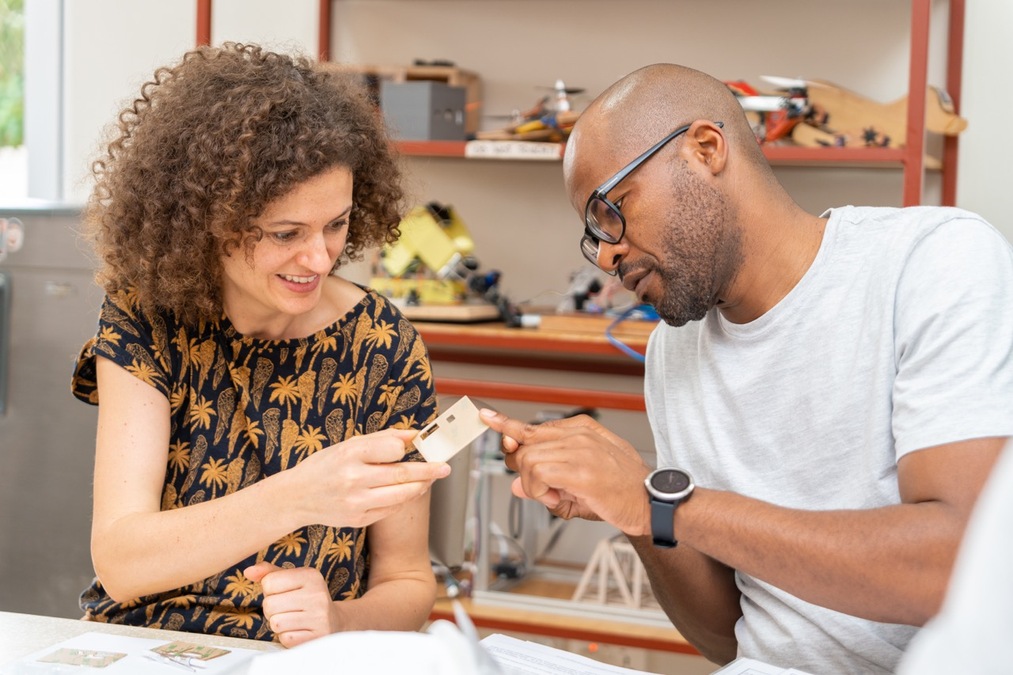Published:

It is cruelly ironic that where diagnostics tests are most needed, they are rarely produced. As a result, approximately 47 percent of the global population has little to no access to diagnostics.
This prompted Maïwenn Kersaudy-Kerhoas, a professor in microfluidics and a lead academic at Heriot-Watt University’s new Health and Care Technologies global research institute, to help create the Global Frugal Diagnostics Network (GFDN).
“During my travels in South America and Africa, I realised that all the innovation in diagnostics is done in the Global North, and I wondered why that was. I think across continents, we've inherited a system that is anachronistic and outdated, with the idea that only the Global North has the power to innovate,” said Maïwenn.
“As a microfluidic engineer I design point of care test components and I’ve developed rapid ways to prototype devices. What I realised is rapid also means accessible, so you don't need a lot of capital investment to be able to prototype as I do in my lab. The type of prototypes and methods I've developed mean you can arrive at something quite close to the end product: moulded plastic that can be produced at high volume.”
The realisation that tests could be developed quickly led Maïwenn to question why her techniques couldn’t be replicated in the Global South. With this in mind, she started contacting academics in some of the countries with the greatest need, with the aim of fostering collaboration and knowledge exchange.
One of them was Dr. Robert Ssekitoleko, an esteemed lecturer and head of the Biomedical Engineering department at Makerere University in Uganda.
“Microfluidics research is quite limited in all of Africa and there are few experts in the field here,” said Robert.
“What we have been doing here at Makerere University is to try to replicate some of the things that they are doing at Heriot-Watt. For example, looking at what machines and tools we need, or have access to, and then how we can repurpose them to make them work as they do in Scotland. But we really needed expert help.
“Here in Africa, we have a huge disease burden but a limited workforce and restricted access to highly expensive, sophisticated machines as well as an underdeveloped regulatory system.
“We don't have many medical device manufacturers here and the very few that we have bring already licensed products from overseas. There is a reluctance to trust things made in Uganda compared to devices made in Europe because our systems and processes are not currently as robust.”
More than 70 companies are either headquartered in, or have manufacturing capacity in, Africa. However, only 33, less than 50%, report having standard quality assurance certifications. Across the continent, countries have weak, misaligned policies for the regulation of medical products, meaning it can often take years for a single health product to be approved for use.
The new African Medicines Agency treaty is a continent-wide platform for strengthening and aligning national and regional regulatory authorities. It is expected to streamline this process.
“In the meantime,” continues Robert, “the network that we've co-created with Maïwenn will provide a platform that can help people to access diagnostics and help us to develop an indigenous manufacturing capability. It could be a game-changer. Of course, not tomorrow, but in the long run.”
The GFDN had its first in-person meeting at Ashesi University, in Ghana in early December. It was attended by academics and researchers from all over the African continent, as well as representatives of charities such as Doctors Without Borders and the Kuehne foundation. It signals the unprecedented need for collaboration and a united effort in delivering change.
“We want to see investment in the capacity of these countries to develop their own products, rather than rely on innovation that is created by people who haven’t experienced the problem and don't have direct access to end users,” said Maïwenn.
“By bringing people together - engineers, biologists, clinicians - along with people knowledgeable in supply chains, commercialisation, and regulation, we're really changing the principle of innovation. It's going to be a long journey, but we want to collaborate and help turn the tables, change the centre of gravity, and rebalance the relationships between the North and the South.”
Anyone interested in collaborating with the new Health and Care Technologies global research institute at Heriot-Watt University can contact GRID@hw.ac.uk
Acknowledgements
We extend our deepest gratitude to all the contributors who have played a pivotal role in the successful realisation of the Global Frugal Diagnostics Network (GFDN) and its inaugural workshop in Accra. Special thanks to Ghanaian photographer, Michel-Manuel Ampofo, for his exceptional photography that vividly captured the essence of our workshop.
We are equally grateful for the significant contributions made by our donors, whose generosity and support have been fundamental in enabling the GFDN and particularly the Accra workshop. Their commitment to fostering global health diagnostics is commendable.
Several insightful blog posts Diagnostic Development Closer to Home, Frugal Diagnostics in Practice, and Global Health Diagnostics in the Wake of COVID-19 have been published by Nature and provide additional information about the Global Frugal Diagnostic network and its aspirations.